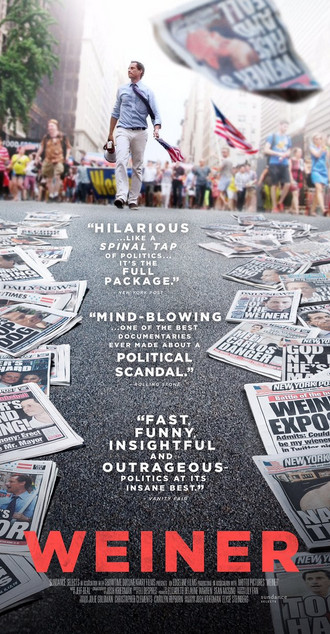
Reviewed by Ty Burr – Boston Globe
In an alternate universe, Anthony Weiner might now be leading New York City more capably than Mayor Bill de Blasio. He has the accent, the aggressiveness, a loyalty to blue-collar locals over gentrifying arrivistes. He’s a policy wonk and a pit bull. Also a politician. Maybe a sociopath. The two are never that far apart.
In this universe, however, Weiner handed the media the red meat it craves not once but twice, the first in 2011 when he was found to have sent sexually explicit pictures of himself to young women over the Internet and resigned from the US Congress in disgrace, and the second when he ran for mayor in 2013 on a second-chance ticket and more online peccadilloes surfaced.
That no physical adultery had occurred was beside the point. That he may have been a good man for the job was secondary. Weiner offered a trifecta of sleaze, sex, and hubris — and then he did it again. Is there such a thing as a sextexta?
And there’s his name, which Josh Kriegman and Elyse Steinberg’s documentary, “Weiner,” offers as both title and punch line. The movie’s a galvanizing, tragicomic work of 21st-century schadenfreude, marred only by a barely repressed giddiness on the part of the filmmakers. But why shouldn’t they be dazzled by their good fortune? Weiner invited them to film his mayoral campaign with the equivalent of an all-access pass. The result is a ringside seat at an immolation.
Kriegman and Steinberg set the stage with a slickly edited replay of the events of 2011, heavy on clips of Weiner’s ebullient media shaming by high priests Jon Stewart and Stephen Colbert. It then settles in with the chastened yet prickly candidate — “I did the thing, but I did a lot of other things, too” is Weiner’s version of a confession — as he works the boroughs and crosswalks of New York.
The story of the first part of the 2013 mayoral primary is that Weiner zoomed up the polls, and the footage shows you why. He connects, saying what audiences want to hear — the necessary knack of any politician, if you know what I mean — but with specific plans and statistics to back up his charisma. If New Yorkers know anything, it’s that everyone is allowed to be an idiot once, as long as you fess up and move on.
So the small army of Weiner volunteers seem both touching in their defensiveness and inexorably doomed; the moment a second round of sextings surfaces, everyone except the candidate knows it’s over. Scenes of Weiner confronting the media hordes, desperate to avoid questions about his nom du sext “Carlos Danger,” are exercises in political comedy — who’d want to talk about anything except “Carlos Danger”? Even so, Weiner’s stubbornness or blindness, his urge to self-destruction in the name of self-glorification, is oddly impressive. To walk away from the race would be to finally break down the rigid, ruinous compartments in his head. Even Weiner concedes he may be too detached from normal human emotions for that to happen.
The movie’s real tragedy, of course, is that of Huma Abedin, a woman who may be a masterful backstage strategist in her role as Hillary Clinton’s aide but who, as Wife of Weiner, was forced into a mortified public perp-walk by his side. Late in the film, on election day, Weiner realizes Abedin won’t come with him as he votes and he decides instead to use their toddler son as a prop; Abedin’s expression as the two leave is a frozen mask into which can be read sorrow, endurance, seething contempt — or maybe nothing at all. She remains the film’s unsolvable mystery, a private person thrust into the most humiliating spotlight of all yet refusing to give the camera what it wants.
Abedin is framed as the one innocent in “Weiner,” the only person whose life isn’t for show. (You want to reach into the screen and take her out for a drink and a cry.) The same can’t be said for her husband’s chief tormenter and phone-sex partner Sydney Leathers, who expects and reaps the usual bonus prizes for modern infamy: a sex tape, appearances on “Howard Stern,” and a camera crew to help chase down “Carlos Danger” on election night.
Weiner the scandal was primarily about a betrayal of public trust. “Weiner” the movie, by contrast, is about the irresistible carnival of public humiliation and the way some people seem drawn to their own destruction. Very late in the going, an offscreen Kriegman asks the candidate the question that’s been bugging us all along: “Why did you let me shoot this film?” Weiner doesn’t give much of an answer, but he doesn’t have to. The movie serves as its own evidence. It knows we can’t look away from the show.
A DISCUSSION FOLLOWS EVERY FILM!
$6.00 Members / $10.00 Non-Members
In an alternate universe, Anthony Weiner might now be leading New York City more capably than Mayor Bill de Blasio. He has the accent, the aggressiveness, a loyalty to blue-collar locals over gentrifying arrivistes. He’s a policy wonk and a pit bull. Also a politician. Maybe a sociopath. The two are never that far apart.
In this universe, however, Weiner handed the media the red meat it craves not once but twice, the first in 2011 when he was found to have sent sexually explicit pictures of himself to young women over the Internet and resigned from the US Congress in disgrace, and the second when he ran for mayor in 2013 on a second-chance ticket and more online peccadilloes surfaced.
That no physical adultery had occurred was beside the point. That he may have been a good man for the job was secondary. Weiner offered a trifecta of sleaze, sex, and hubris — and then he did it again. Is there such a thing as a sextexta?
And there’s his name, which Josh Kriegman and Elyse Steinberg’s documentary, “Weiner,” offers as both title and punch line. The movie’s a galvanizing, tragicomic work of 21st-century schadenfreude, marred only by a barely repressed giddiness on the part of the filmmakers. But why shouldn’t they be dazzled by their good fortune? Weiner invited them to film his mayoral campaign with the equivalent of an all-access pass. The result is a ringside seat at an immolation.
Kriegman and Steinberg set the stage with a slickly edited replay of the events of 2011, heavy on clips of Weiner’s ebullient media shaming by high priests Jon Stewart and Stephen Colbert. It then settles in with the chastened yet prickly candidate — “I did the thing, but I did a lot of other things, too” is Weiner’s version of a confession — as he works the boroughs and crosswalks of New York.
The story of the first part of the 2013 mayoral primary is that Weiner zoomed up the polls, and the footage shows you why. He connects, saying what audiences want to hear — the necessary knack of any politician, if you know what I mean — but with specific plans and statistics to back up his charisma. If New Yorkers know anything, it’s that everyone is allowed to be an idiot once, as long as you fess up and move on.
So the small army of Weiner volunteers seem both touching in their defensiveness and inexorably doomed; the moment a second round of sextings surfaces, everyone except the candidate knows it’s over. Scenes of Weiner confronting the media hordes, desperate to avoid questions about his nom du sext “Carlos Danger,” are exercises in political comedy — who’d want to talk about anything except “Carlos Danger”? Even so, Weiner’s stubbornness or blindness, his urge to self-destruction in the name of self-glorification, is oddly impressive. To walk away from the race would be to finally break down the rigid, ruinous compartments in his head. Even Weiner concedes he may be too detached from normal human emotions for that to happen.
The movie’s real tragedy, of course, is that of Huma Abedin, a woman who may be a masterful backstage strategist in her role as Hillary Clinton’s aide but who, as Wife of Weiner, was forced into a mortified public perp-walk by his side. Late in the film, on election day, Weiner realizes Abedin won’t come with him as he votes and he decides instead to use their toddler son as a prop; Abedin’s expression as the two leave is a frozen mask into which can be read sorrow, endurance, seething contempt — or maybe nothing at all. She remains the film’s unsolvable mystery, a private person thrust into the most humiliating spotlight of all yet refusing to give the camera what it wants.
Abedin is framed as the one innocent in “Weiner,” the only person whose life isn’t for show. (You want to reach into the screen and take her out for a drink and a cry.) The same can’t be said for her husband’s chief tormenter and phone-sex partner Sydney Leathers, who expects and reaps the usual bonus prizes for modern infamy: a sex tape, appearances on “Howard Stern,” and a camera crew to help chase down “Carlos Danger” on election night.
Weiner the scandal was primarily about a betrayal of public trust. “Weiner” the movie, by contrast, is about the irresistible carnival of public humiliation and the way some people seem drawn to their own destruction. Very late in the going, an offscreen Kriegman asks the candidate the question that’s been bugging us all along: “Why did you let me shoot this film?” Weiner doesn’t give much of an answer, but he doesn’t have to. The movie serves as its own evidence. It knows we can’t look away from the show.
A DISCUSSION FOLLOWS EVERY FILM!
$6.00 Members / $10.00 Non-Members







